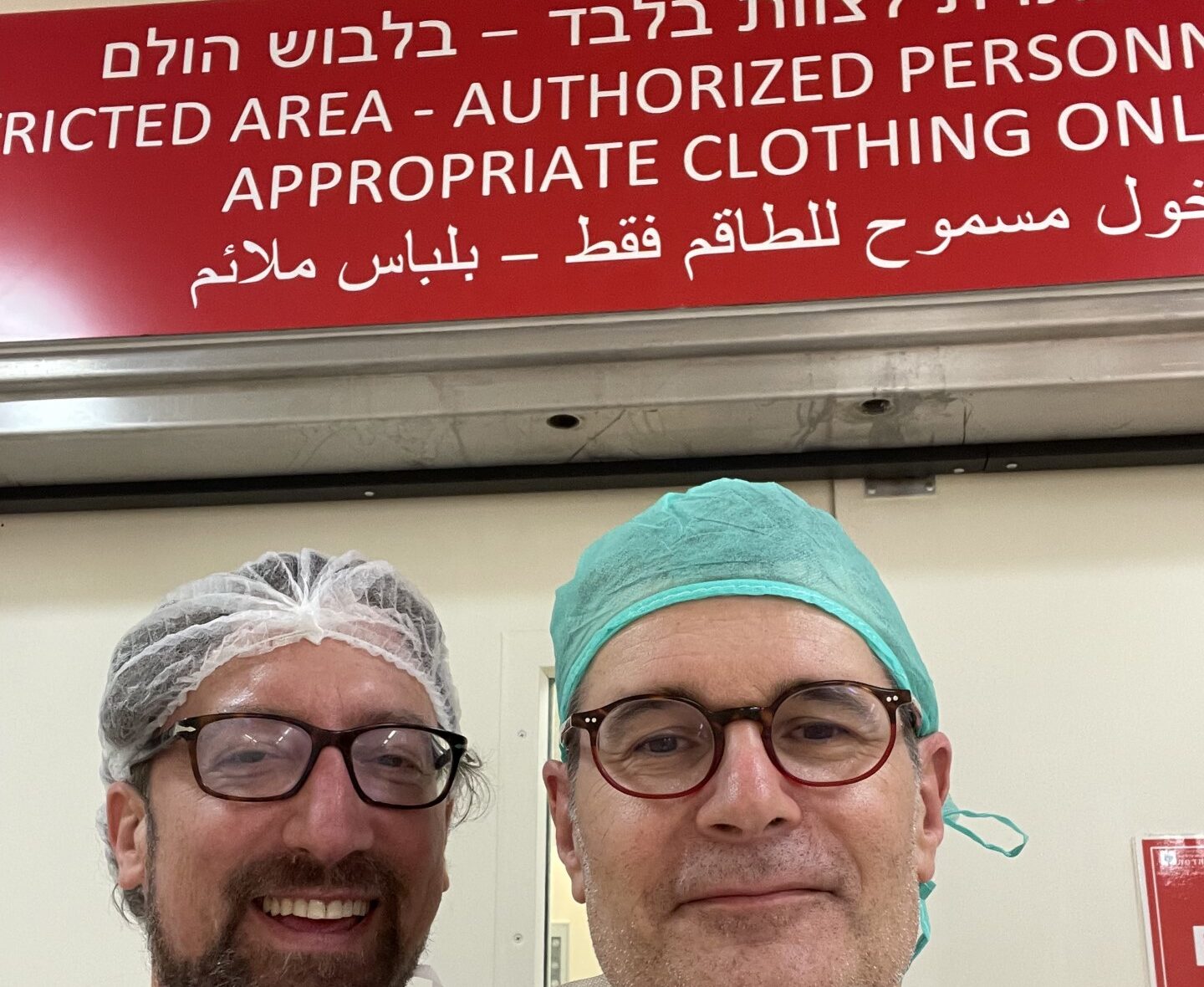Dr. Jeffrey Fialkov, the head of plastic surgery at Sunnybrook Health Sciences Centre in Toronto, arrived in Israel at just the right time, says the doctor who he trained to treat patients with complicated injuries.
Allan Billig, a senior plastic surgeon at Hadassah Hospital in Jerusalem, studied with Fialkov in Toronto three years ago. The two have kept in close touch since, discussing difficult situations. Fialkov, who specializes in craniomaxillofacial cases (dealing with the head, neck and jaw), was in Israel for the first half of March, teaching, assisting with operations and meeting with the next doctors who will come to Sunnybrook as plastic surgery fellows.
“Everybody knows in theory the things that need to be done, but there’s a big gap between theory and execution,” said Billig. “Everybody memorizes the book, but until you see it and do it with a mentor and then start to do it on your own, that’s a very big step.
“These are not easy cases. To have Jeff by my side, even three years later, it’s a real gamechanger.”
At Hadassah Hospital, about 30 percent of the staff have been called up by the army. The hospital is also treating soldiers injured in the fighting in Gaza. Billig said he sees soldiers who have been caught near explosions and suffered shrapnel injuries or have been shot in the face.
“The volume and complexity of cases has gone up, but the people fixing them has stayed the same.”
A recent operation the two doctors performed involved a soldier who had his ear cut off when a bullet skimmed by the side of his head. The heat and friction generated by the bullet also caused the patient’s brain to swell and his damaged skull had to be removed and replaced. It was Billig’s delicate task to find a way to cover and protect the artificial bone with the patient’s own scarred skin.
Billig visited his patient shortly before speaking with The CJN.
“I just saw him and he’s awake and good,” he said. “He’s anxious, with his new skull, to go back into the army.”
A number of years ago Fialkov had noticed that Israel did not have plastic surgeons who specialized in adult craniofacial surgery. After consulting Israeli surgeons to see if it was a skill they needed, he invited doctors to participate in a medical fellowship at Sunnybrook to learn the advanced techniques.
Fialkov has deep and personal ties to Israel. His father was a Holocaust survivor, who had started his medical training in Poland, originally in oral surgery, a field very similar to his Fialkov’s own. After the war, his father continued his medical education in Israel and graduated from Rambam Medical Centre with a specialty in otolaryngology (ear, nose and throat).
“Anything that has to do with medicine that is Israeli-related has a very close place in my heart,” Fialkov said in an interview from a Jerusalem hotel, after a day in the hospital. “When I saw that there was this gap, I thought to myself, Israel shouldn’t have a gap–Israel has so much incredible talent, so much technology, so much potential, this is a gap I think I can help fill.”

Plastic surgery and craniofacial surgery started developing in Canada during the First World War, before Israel even existed as a modern state, he pointed out. With a population of only 9 million people, it’s more challenging for Israel to develop the critical mass of doctors with highly specialized skills.
Sunnybrook, meanwhile, is uniquely positioned to train Israeli fellows. The plastic surgery department has two doctors for every specialty and as Toronto’s principal trauma centre, it sees a large volume of patients. The next Israeli doctor arriving will train in the field of nerve reconstruction, Fialkov said.
The collaboration came out of chance—or perhaps fate. Billig had trained as a plastic surgeon and was working at Hadassah, but was unsure what area to specialize in.
Another doctor who had recently returned from a fellowship at SickKids Hospital, and recalled meeting Fialkov at synagogue, one day connected the two.
Some of the difficult cases the pair of doctors worked on in Israel involved correcting surgeries that had been “sub-optimal” in the first place and left the patients with ongoing problems.
“Now I’m seeing cases, that if we had it (the knowledge) back then, we wouldn’t have even reached the point where they needed corrections of complications from the first surgery,” Billig said.
Fialkov has also taken his specialized skills to Canada’s far North to treat patients there. Working in Israel and Nunavut keep him humble, he says.
“When I’m back home at Sunnybrook, in my operating room, I’m the king. When I go to Nunavut or when I come to Israel, I’m not the king, I’m barely a prince. That’s really good for me, I think it’s good for anybody. It really whittles things down to what can I genuinely offer these people.”




